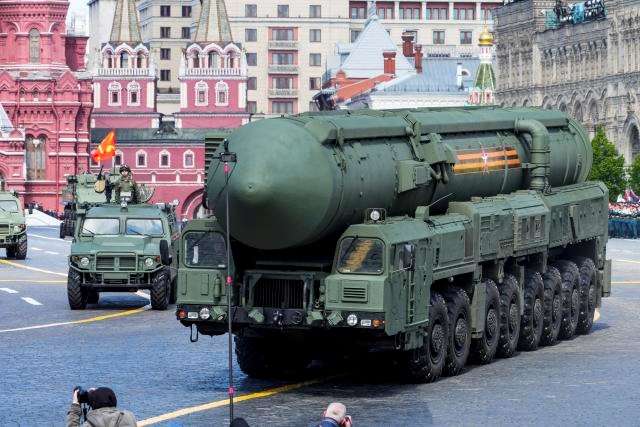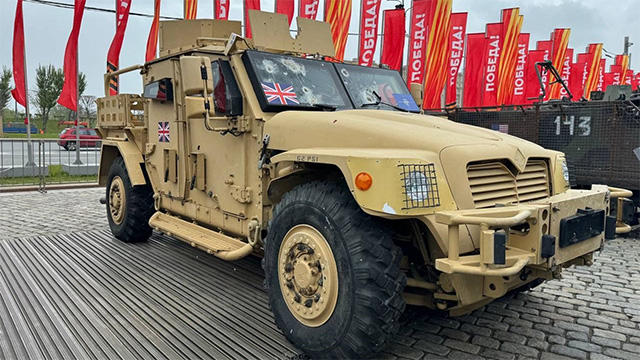TV broadcast frame
Russia wrapped itself in patriotic pageantry for Victory Day, as President Vladimir Putin celebrated the defeat of Nazi Germany in World War II by hailing his forces in Ukraine and blasting the West for fueling conflicts around the world, writes ‘The Washington Post’.
Even though few veterans of what Russia calls the Great Patriotic War are still alive 79 years after Berlin fell to the Red Army, the victory remains the most important and widely revered symbol of Russia’s prowess and a key element of national identity.
Two days after beginning his fifth term in office, Putin led the festivities across Russia that recall the nation’s wartime sacrifice.
“Victory Day unites all generations,” Putin said in a speech in Red Square that came on the coldest May 9 in decades amid some snow flurries. “We are going forward relying on our centuries-old traditions and feel confident that together we will ensure a free and secure future of Russia.”
As battalions marched by and military hardware — both old and new — rumbled over the cobblestones, the sky cleared briefly to allow a flyby of warplanes, some of which trailed smoke in the white, red and blue of the Russian flag.
Putin hailed the troops fighting in Ukraine for their courage and blasted the West, accusing it of “fueling regional conflicts, inter-ethnic and inter-religious strife and trying to contain sovereign and independent centers of global development.”
With tensions over Ukraine between Russian and the West soaring to their highest level since the Cold War, Putin issued another stark reminder of Moscow’s nuclear might.
“Russia will do everything to prevent global confrontation, but will not allow anyone to threaten us,” he said. “Our strategic forces are in combat readiness.”
Nuclear-capable Yars intercontinental ballistic missiles were pulled across Red Square, underscoring his message.
The Soviet Union lost about 27 million people in World War II, an estimate that many historians consider conservative, scarring virtually every family.
Nazi troops overran much of the western Soviet Union when they invaded in June 1941, before being driven back all the way to Berlin, where the USSR’s hammer and sickle flag was raised above the ruined capital. The U.S., U.K, France and other allies mark the end of the war in Europe on May 8.
The immense suffering and sacrifice in cities like Stalingrad, Kursk and Putin’s native Leningrad — now St. Petersburg — still serve as a powerful symbol of the country’s ability to prevail against seemingly overwhelming challenges.
Since coming to power on the last day of 1999, Putin has made May 9 an important part of his political agenda, featuring missiles, tanks and fighter jets. Medal-bedecked veterans joined him Thursday to review the parade, and many — including the president — wore the black-and-orange St. George’s ribbon that is traditionally associated with Victory Day.
About 9,000 troops, including about 1,000 who fought in Ukraine, took part in Thursday’s parade.
Although the U.S. and U.K. ambassadors did not attend, Putin was joined by other dignitaries and presidents of several former Soviet nations along with a few other Moscow allies, including the leaders of Cuba, Guinea-Bissau and Laos.
When he sent troops into Ukraine on Feb. 24, 2022, Putin evoked World War II in seeking to justify his actions that Kyiv and its Western allies denounced as an unprovoked war of aggression. Putin cited the “denazification” of Ukraine as a main goal of Moscow. Putin tried to cast Ukraine’s veneration of some of its nationalist leaders who cooperated with the Nazis in World War II as a sign of Kyiv’s purported Nazi sympathies. He regularly made unfounded references to Ukrainian nationalist figures such as Stepan Bandera as an underlying justification for the Russian military action in Ukraine.
 Photo: RIA Novosti
Photo: RIA Novosti
Russia on Thursday wrapped itself in patriotic pageantry for Victory Day, as President Vladimir Putin celebrated the defeat of Nazi Germany in World War II by hailing his forces fighting in Ukraine and blasting the West for fueling conflicts around the world, stresses AP.
Even though few veterans of what Russia calls the Great Patriotic War are still alive 79 years after Berlin fell to the Red Army, the victory remains the most important and widely revered symbol of Russia’s prowess and a key element of national identity.
“Victory Day unites all generations,” Putin said in a speech in Red Square that came on the coldest May 9 in decades amid some snow flurries. “We are going forward relying on our centuries-old traditions and feel confident that together we will ensure a free and secure future of Russia.”
Putin hailed the troops fighting in Ukraine as “our heroes” for their courage, resilience and self-denial, adding that “all of Russia is with you.”
He accused the West of “fueling regional conflicts, inter-ethnic and inter-religious strife and trying to contain sovereign and independent centers of global development.”
With tensions with Washington over Ukraine soaring to their highest level since the Cold War, Putin issued another stark reminder of Moscow’s nuclear might.
“Russia will do everything to prevent global confrontation, but will not allow anyone to threaten us,” he said. “Our strategic forces are in combat readiness.”
Nuclear-capable Yars intercontinental ballistic missiles were pulled across Red Square, underscoring his message.
The Soviet Union lost about 27 million people in World War II, an estimate that many historians consider conservative, scarring virtually every family.
 Nuclear-capable Yars intercontinental ballistic missiles at the Red Square in Moscow 9 May, 2024.
Nuclear-capable Yars intercontinental ballistic missiles at the Red Square in Moscow 9 May, 2024.
Putin begins his fifth term, stronger than ever, pledging victory in the ongoing war in Ukraine, and confronting the Western coalition seeking to subjugate Russia and suppress it from achieving its vital goals in a multipolar world, writes ‘Al Khaleej’ from UAE.
In his swearing-in speech, Putin reiterated that his country would emerge “stronger from a difficult stage,” and that Russia’s leadership was “a great honor, a responsibility and a sacred duty.” This sentence alone is sufficient to summarize a broad vision of ambitions and goals to impose geopolitical authority for Moscow in a world that, as experience has shown, is It does not submit to change except with determination, strength, will, and competence in defending national interests.
Putin has begun his fifth term, making him the longest-serving Kremlin master since Soviet leader Joseph Stalin. Under the recent amendment to the constitution, he is eligible for a sixth term until 2036. This is a sufficient period to relaunch Russia as a superpower, as Peter the Great did three centuries ago.
 In Moscow's Victory Park, there's an exhibition called Trophies.
In Moscow's Victory Park, there's an exhibition called Trophies.
Western tanks and armoured vehicles Russia captured on the battlefield in Ukraine are proudly on display.
Photo: SKY News
It's hard to overstate the importance of Victory Day in Russia, which marks the anniversary of the end of the Second World War, notes SKY News correspondent.
The patriotic fervour has been building for the past fortnight.
Moscow has been coloured red with giant flags on almost every corner.
This year, the 79th anniversary, is not exactly a major milestone – so why is it so big?
I think it can be summed up by three Ps: pain, pride and propaganda.
Pain refers to the deaths of around 27 million Soviet citizens during the defeat of Nazi Germany.
It was a collective grief of monstrous proportions - practically every family was affected - and it's still felt today.
Advertisement
But there is great pride felt at the role played by the Soviet Union. It was a time when (together with the Allies) they essentially ruled the world.
Now, though, many Russians feel that status is not properly acknowledged by the West. This serves as a reminder.
The atmosphere this year, however, feels turbo-charged, and that's down to the final reason - propaganda.
The Kremlin is using one war to inform opinion on another – the current conflict with Ukraine.
In Moscow's Victory Park, there's an exhibition called Trophies.
Western tanks and armoured vehicles Russia captured on the battlefield in Ukraine are proudly on display. Guides offer tours in English and Chinese.
The idea is to conflate the two conflicts – the Second World War and the special military operation - so Russians view them in the same way. That heroism and sacrifice will win the day. That Russia, crucially, is on the right side of history.
It certainly seems to be working.
read more in our Telegram-channel https://t.me/The_International_Affairs

 10:48 10.05.2024 •
10:48 10.05.2024 •























